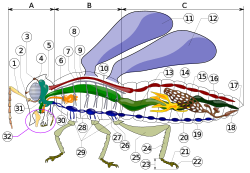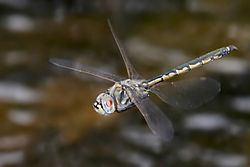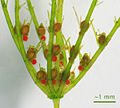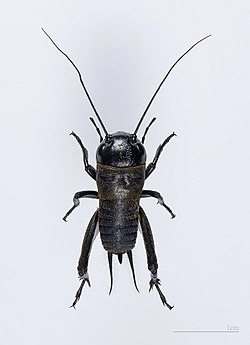Female insects are able to make eggs, receive and store sperm, manipulate sperm from different males, and lay eggs. Their reproductive systems are made...
11 KB (1,541 words) - 09:21, 30 May 2025
The reproductive system of an organism, also known as the genital system, is the biological system made up of all the anatomical organs involved in sexual...
24 KB (3,029 words) - 19:21, 19 May 2025
The insect nervous system consists of a brain and a ventral nerve cord. Most insects reproduce by laying eggs. Insects breathe air through a system of...
135 KB (12,811 words) - 07:30, 7 June 2025
Vagina (category Human female reproductive system)
fish and amphibians). In insects and other invertebrates, the vagina can be a part of the oviduct (see insect reproductive system). Birds have a cloaca into...
172 KB (17,712 words) - 22:29, 7 June 2025
Insect physiology includes the physiology and biochemistry of insect organ systems. Although diverse, insects are quite similar in overall design, internally...
35 KB (4,441 words) - 04:43, 29 January 2025
Lepidoptera genitalia (redirect from Socius (insect anatomy))
genitalia depends upon the taxonomic group that insect belongs to, the internal female reproductive system of all Lepidopterans consists of paired ovaries...
7 KB (867 words) - 10:18, 4 October 2024
species of insect. Long, slender (extratory) malpighian tubules can be found between the junction of the mid- and hind gut. The reproductive system of females...
129 KB (17,133 words) - 00:16, 9 June 2025
Eusociality (redirect from Eusocial insect)
individuals truly dependent on each other for survival and reproductive success. For many insects, this irreversibility has changed the anatomy of the worker...
75 KB (8,461 words) - 15:44, 9 June 2025
Female sperm storage (category Animal reproductive system)
retention, such as insect spermatheca and bird sperm storage tubules (bird anatomy), to more general regions of the reproductive tract enriched with...
26 KB (3,248 words) - 05:30, 23 May 2025
Arthropod (redirect from Reproductive system of arthropods)
coelom of the arthropod is reduced to small areas around the reproductive and excretory systems. Its place is largely taken by a hemocoel, a cavity that runs...
142 KB (13,661 words) - 06:52, 9 June 2025
Bird anatomy (redirect from Avian reproductive system)
then gliding. The forelimbs could be used for grasping after a jump or as "insect trapping nets", animals could wave them, helping themselves during the jump...
82 KB (9,617 words) - 18:17, 23 May 2025
Frog (redirect from Reproductive system of frogs)
have a carnivorous diet consisting of small invertebrates, especially insects, but omnivorous species exist and a few feed on plant matter. Frogs generally...
175 KB (19,915 words) - 17:59, 9 June 2025
of x-ray photon irradiation on the reproductive cells of the insects. SIT does not involve the release of insects modified through transgenic (genetic...
24 KB (2,678 words) - 09:02, 9 June 2025
males. The reproductive strategies of many species include at least some amount of asexual reproduction by parthenogenesis. Some scale insects are serious...
46 KB (4,763 words) - 22:08, 29 May 2025
particular insect of interest is complicated and a long, intensive process. For example, using pheromones only attracts insects in their reproductive stage...
13 KB (1,613 words) - 00:12, 27 June 2024
"Microorganisms associated with chromosome destruction and reproductive isolation between two insect species", Nature, 346 (6284): 558–560, Bibcode:1990Natur...
76 KB (9,106 words) - 00:26, 29 May 2025
one reproductive cycle, they can afford to expend energy on maternal care because those offspring are her only offspring. An iteroparous insect does...
37 KB (4,526 words) - 17:11, 3 June 2025
silverfish never evolved wings. In some eusocial insects like ants and termites, only the alate reproductive castes develop wings during the mating season...
65 KB (8,525 words) - 19:55, 21 February 2025
Male accessory gland (redirect from Insect male accessory gland)
glands.[better source needed] These glands are found only in mammals. In insects, male accessory glands produce products that mix with the sperm to protect...
7 KB (797 words) - 03:45, 12 January 2025
Sex organ (redirect from Reproductive organ)
A sex organ, also known as a reproductive organ, is a part of an organism that is involved in sexual reproduction. Sex organs constitute the primary sex...
20 KB (1,992 words) - 02:03, 23 April 2025
Diapause (redirect from Reproductive diapause)
butterfly, Danaus plexippus. In cases where the insect remains active, feeding is reduced and reproductive development is slowed or halted. Embryonic diapause...
24 KB (2,791 words) - 19:07, 25 May 2025
which are larger than other wētā, despite the latter also being large by insect standards. Large species can be up to 7 cm (3 in), not inclusive of legs...
32 KB (3,285 words) - 11:51, 22 May 2025
reproduction. The breeding system, or how the sperm from one plant fertilizes the ovum of another, depends on the reproductive morphology, and is the single...
30 KB (3,011 words) - 04:25, 31 May 2025
Aedeagus (category Animal reproductive system)
An aedeagus (/iˈdi.ə.ɡəs/ or /i.diˈeɪ.ɡəs/ pl. aedeagi) is a reproductive organ of male arthropods through which they secrete sperm from the testes during...
4 KB (455 words) - 22:17, 15 November 2024
Zootermopsis nevadensis (category Insects of North America)
this feature could participate in reproductive females' longevity. Juvenile hormones (JHs) are involved in insect development, reproduction, longevity...
13 KB (1,608 words) - 08:57, 16 October 2024
Cephalopod (redirect from Reproductive system of cephalopods)
1007/s10152-010-0217-0. hdl:10261/44487. S2CID 41577834. Arkhipkin, A.I. (1992). "Reproductive system structure, development and function in cephalopods with a new general...
140 KB (15,695 words) - 16:24, 25 May 2025
Copidosoma floridanum (category Insects described in 1900)
subfamily Plusiinae. It has the largest recorded brood of any parasitoidal insect, at 3,055 individuals. The life cycle begins when a female oviposits into...
16 KB (1,743 words) - 10:06, 25 November 2024
Penis (redirect from Insect penises)
Origins of Human Mating Systems. John OUP Oxford. p. 68. ISBN 978-0-19156-973-9. Susan Long (2006). Veterinary Genetics and Reproductive Physiology. Churchill...
43 KB (4,047 words) - 04:29, 5 June 2025
Blattodea (category Insect orders)
Termites are eusocial insects that live in colonies. They have a caste system, with a king and queen in each colony and many non-reproductive workers. The workers...
27 KB (2,882 words) - 14:39, 28 February 2025
individuals, the flight muscles deteriorate during adulthood and the insect's reproductive capabilities improve. Captive crickets are omnivorous; when deprived...
50 KB (5,665 words) - 17:10, 28 April 2025























